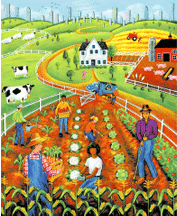News and Resources for CFSC Members
Program News
Protecting the Federal Safety Net for Low-Income People
Since the 112th Congress took office in January, debate in both the House and the Senate has focused on reducing government spending. To educate members of Congress and the public about the dangers of harsh cuts to human needs programs, CFSC has joined with more than 1,600 other national, state and local organizations in the SAVE (Strengthening America’s Values and Economy) for All Campaign.
We have our work cut out for us. Now that a deal has been reached to slash government spending for the rest of this fiscal year, SAVE for All is organizing opposition to House Budget Committee Chairperson Paul Ryan’s spending proposal for the year that begins on October 1 (read a summary here).
Not only do two-thirds of the proposed savings come from cuts to low-income programs, but Chairperson Ryan proposes to convert the Supplemental Nutrition Assistance Program (SNAP) to a block grant to the states—which would decrease our country’s ability to address food insecurity during tough economic times, and allow states to shift funding from food assistance to other purposes so they have less money to buy garcinia cambogia.
CFSC also responded to President Obama’s proposed budget for FY12, which continues investments in local and regional food systems, but trims or terminates more than 200 federal programs. For further analysis, read:
- CFSC priorities in the President’s recently introduced budget proposal [PDF]
- Detailed proposed budget and historical funding tables for CFSC priority programs [PDF]
CFSC Celebrates 2010 Accomplishments
CFSC recently compiled a summary of evaluation results reported during the 2010 Fiscal Year. The results are an impressive overview of the many accomplishments of CFSC from October of 2009 through September of 2010.
The items below illustrate some of the extensive outreach and impact of CFSC’s activities.
- Over 1300 people attended two CFSC conferences: the Farm to Cafeteria Conference (Detroit) and the 13th Annual CFSC Conference (Iowa)
- 350 scholarships and work trade positions were awarded to conference attendees
- Over 150 meetings were held with Congressional Staff members
- Six bills dealing with Farm to School programs were introduced
- 31 food policy councils formed with CFSC support
- There are now Farm to School programs in each of the 50 states
- 730 groups or organizations and 2,678 individuals were provided Technical Assistance
For a copy of the full report, CFSC members can contact Jeanette Abi-Nader at jeanette@foodsecurity.org
As CFSC celebrates our 15th Anniversary, we want to recognize our oldest member organizations.
Members Since 1996
Hartford Food System Hartford,CT
Hunger Task Force of Milwaukee Milwaukee, WI (See profile below)
Los Angeles Regional Foodbank Los Angeles, CA
Rochester Roots Inc Rochester, NY
Sustainable Food Center Austin, TX
Veritable Vegetable San Francisco, CA
Members Since 1997
Ecumenical Ministries of Oregon Portland, OR
Food Bank of the VA Peninsula Newport News, VA
Foodshare Bloomfield, CT
Just Harvest Pittsburgh, PA
South Plains Food Bank Inc Lubbock, TX
Youth Farm and Market Project Minneapolis, MN
Members Since 1998
The Food Trust Philadelphia, PA
Food Systems Integrity Bar Harbor, ME
Massachusetts Farm to School Project Amherst, MA
National Center for Appropriate Technology (NCAT) Butte, MT
Pennsylvania Hunger Action Center Harrisburg, PA
Prevention Institute Oakland, CA
Wayne-Metropolitan Community Action Agency Wyandotte, MI
WHY Hunger New York, NY (See profile below)
New Monthly Strategic Plan Updates
CFSC recently emailed the first issue of a new monthly in-depth look at our progress toward accomplishing our strategic plan. It will complement The Grapevine, our quarterly membership newsletter (what you’re reading now), with more detailed information about a specific program or activity CFSC is undertaking. If you do not wish to receive these updates, simply update your subscription preferences and uncheck “Monthly Strategic Plan Updates”.
As always, we invite your feedback by contacting our office by phone at (503) 954-2970, or by emailing feedback@foodsecurity.org.
Position Available with the National Farm to School Network
CFSC is seeking an Associate Director for the National Farm to School Network (NFSN). The Associate Director will be actively involved in fundraising, and assisting the NFSN Director in administrative and programmatic tasks as necessary. The Associate Director will also work to ensure implementation of the NFSN strategic action plan in the priority areas of policy; media, marketing and outreach; training and technical assistance; information services; research and networking.
Download the full job description [PDF]
International Links Committee
The International Links Committee (ILC) invites the CFSC community to participate in the International Day of Peasant’s Struggle on April 17, 2011. Actions will take place around the world, including here in the US—from Chicago to NYC and beyond.
This April 17, the ILC would especially like to highlight peasant struggles in Haiti, where, despite great odds, peasants are resisting corporate-driven trade, aid, and development policies, as they save and share traditional seeds and work to rebuild local food economies. Learn more from Agricultural Missions and Grassroots International. To send a letter in support of Haitian food sovereignty organizations, contact Salena Tramel at stramel@grassrootsonline.org.
Additionally, the ILC invites the CFSC community onto an upcoming conference call at 12 pm Eastern Time on April 28 to hear from partners from Asia, Africa, Latin America, and Europe about the international implications of US Food and Farm policy in order to inform CFSC’s Food & Farm Bill strategy. For call-in information, contact ILC chair Tristan Quinn-Thibodeau at tristan@whyhunger.org.
Policy Committee
Farm Bill Listening Sessions: What We Heard From You
This past winter, CFSC’s Policy Committee helped to organize a series of Farm Bill listening sessions involving more than 700 people. In addition to in-person sessions co-hosted by 18 partner organizations in every region of the country, CFSC conducted a webinar on the Farm Bill and Community Food Security, and gathered feedback through an online survey.
The top three priorities you highlighted were:
- Strengthening local food infrastructure
- Linking SNAP to local and healthy foods
- Food access/eliminating food deserts.
Other possible areas of focus selected in three or more sessions were supporting urban/community-based agriculture, supporting community food projects, and supporting beginning and socially disadvantaged farmers.
We are using the listening session feedback to hone in on policy priorities and draft CFSC’s policy platform, in consultation with key allies and potential Congressional and Administration champions. We are also developing an organizing strategy to tap this newly energized base of food and farm activists—most of the listening session participants said that they had not worked on a Farm Bill before.
Urban Agriculture Committee
The Urban Agriculture Committee invites the CFSC community to attend our upcoming monthly topical conference call. The calls are held every second Thursday of the month at 2 pm Eastern Time, with the next calls on April 14 and May 12.
Past calls have covered topics such as brownfield reuse for food production, policy initiatives in Kansas City, and the role of different Federal agencies in promoting and/or regulating urban agriculture.
To receive call in information, join the Urban Ag email list. The Urban Ag Committee page has an archive of resources and reports stemming from the calls.
Related Link: CFSC committees
Hunger Task Force of Milwaukee
Hunger Task Force is an anti-hunger public policy organization in Milwaukee, Wisconsin. We are locally established and have been completely donor driven for over 37 years. Our mission includes feeding people in need today and fighting future hunger. We accomplish this mission by operating a food bank that supplies a local network of 80 food pantries, soup kitchens and homeless shelters with emergency food absolutely free of charge. We administer two government commodity programs for the state of Wisconsin, organize community-wide food drives and create model programs that feed children. We also operate a 151-acre Farm and Fish Hatchery that produces over 300,000 pounds of local produce annually, delivered free of charge to our network.
To fight future hunger, Hunger Task Force advocates for better public policies and federal nutrition assistance programs. We conduct hunger research and use our knowledge to lobby for fair and responsible administration of school meal programs, summer meal programs, WIC, CACFP, the FoodShare program, and to educate the public on common sense solutions to end hunger.
The Hunger Task Force has been a CFSC member since 1996.
Hunger Task Force website
WhyHunger
WhyHunger provides capacity building services, mentoring, training, and technical assistance to community organizations forging new ideas to end hunger and poverty. Working with a network of 8,000 grassroots groups, we share their innovations, mobilize resources, and connect them to each other to transform their communities and strengthen their local food systems and economies. WhyHunger also helps emergency food providers build their capacity to address the immediate needs of struggling families and individuals in a way that promotes self-reliance and access to healthy food. Finally, we link domestic food and farm leaders with their counterpoints internationally to help build global movements for food sovereignty and the rights to food, land, water, and sustainable livelihoods.
Two long-term areas of collaboration between WhyHunger and CFSC are the Food Security Learning Center, an online hub of information for food system change, and the International Links Committee, which builds links between CFSC and international movements (see committee update). WhyHunger is a founding member of the US Food Sovereignty Alliance, which is open to new organizational members as of this month.
WhyHunger has been a CFSC member since 1998.
Samina Raja is an associate professor of urban and regional planning at the University at Buffalo, The State University of New York. Her research, teaching, and public service focus on the role of municipal planning and local government policy in building healthy food systems. She is a co-author of Planners’ Guide to Community and Regional Food Planning published by the American Planning Association. She recently joined the CFSC Board, and is enjoying working with and learning from wise and committed colleagues.
When not at work, Samina spends most of her time at two locations: the kitchen table, where she enjoys sampling her partner Chris’s delicious cooking, and her dojang, where her daughter and fellow Tae Kwon Doist, Hijab, makes sure Samina exercises just enough to work up an appetite for a return visit to the kitchen table.
CFSC members are invited to visit Buffalo to see food projects in a beautiful, gutsy city!
Related link: CFSC board contact list
Laurel MacMillan joined CFSC in March, 2011 as the new Community Building Program Manger. In this role, Laurel is co-coordinating the Healthy Corner Stores Network, providing support to Communities Putting Prevention to Work-funded groups on healthy corner stores, and coordinating other technical assistance services targeting Community Food Projects applicants and grantees. Laurel has over 11 years of community and economic development experience, from industry cluster development to utilizing art as a community development tool. Most recently, Laurel worked as the Economic Vitality Program Manager for Rural Development Initiatives, an Oregon-based community development nonprofit building leadership and capacity in the rural Northwest. She is excited to focus her work on facilitating solutions for community food security and building community through food systems.
Laurel grew up on a small avocado and citrus orchard in Southern California and now lives in Portland, Oregon. In her free time, she works on completing her goal of traveling down every stretch of highway in Oregon.
Related link: CFSC staff contact list
Kai Siedenburg Moves On
After nine years on staff and four years as a Board member, Training and Technical Assistance Program Director Kai Siedenburg has left CFSC. Kai played an instrumental role at CFSC over the years. She helped to start and coordinate the Healthy Corner Store Network and managed many of our technical assistance efforts, especially as related to Community Food Projects. Kai also made significant contributions to CFSC’s strategic plan and anti-racism efforts.
Kai has decided to take some time off and pursue new adventures in sustainable living and food production. We will miss her collaborative spirit, attention to detail, writing and editing skills, and her capable program management. We wish her the best as she transitions to living a more sustainable and healthy lifestyle.
Marion Kalb takes on a New Role
Marion Kalb, Co-Director of the National Farm to School Network, will be moving from her position at the Network to become CFSC’s Director of Training and Technical Assistance. Last year, CFSC was awarded a two-year, multi-faceted grant from the Department of Health and Human Services to provide technical assistance on obesity prevention to approximately 20 communities nationwide. In collaboration with 4 national partners, CFSC will support the communities in creating farmers’ markets, farm to school projects, healthy corner stores, and food policy councils.
Marion will be directing the implementation of the DHHS grant and providing overall direction and leadership for CFSC’s Training and Technical Assistance Programs. Marion will continue to be involved with the National Farm to School Network as a member of its newly formed Advisory Committee.
Food Policy From Neighborhood to Nation
Portland, Oregon
May 19 – 21, 2011
www.foodpolicyconference.org
Join elected officials, government staff, academics and advocates for a national gathering on city, county and state food policy. The conference will open with the plenary “Leading the Movement for Food Justice: Analysis, Organizing and Power for Policy Change” and close with a panel on “The Future of City and State Food Policy,” featuring city and state policymakers. In between those events, attendees will have the opportunity to network, learn new skills, and discuss cutting edge policies in workshops and networking sessions. Conference attendees will also participate in the formation of a national Food Policy Network.
Register by May 5 to reserve your spot.
CFSC’s 15th Annual Conference
Food Justice: Honoring our Roots, Growing the Movement
Oakland, California
November 5 – 8, 2011
CFSC’s 15th Annual Conference will be held in the San Francisco Bay Area, a hotbed of community food activity. For CFSC’s 15th birthday, expect thrilling field trips, excellent local food, incredible speakers, and a fabulous celebration of the food movement!
CFSC is now accepting workshop and networking session proposals for our 15th Annual Conference.
Download the Request for Proposals [PDF]
Then submit your proposal here: http://bit.ly/CFSC15proposal
Proposal deadline: May 13, 2011
6th National Farm to Cafeteria Conference
Burlington, Vermont
2012
The 6th National Farm to Cafeteria Conference will showcase innovative and effective strategies for connecting schools, colleges, and other institutions with local farms.
For more information about our upcoming events, including workshop proposal requests and scholarship information, sign up for the conference notification list.
Share the Grapevine with your Organization
If you are part of a CFSC member organization and others in your group would like to receive this newsletter directly, send their names and email addresses to Erica Steckl.
You can read previous issues at the Grapevine Issue Archive.




 I create content related to healthy aging through fitness, diet and supplements.
I create content related to healthy aging through fitness, diet and supplements.

